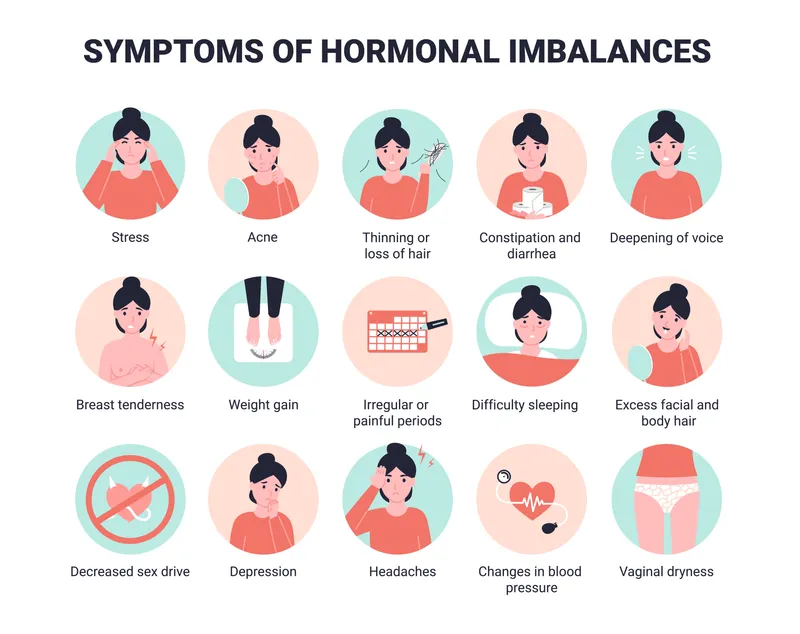Here’s how you can ensure hormone balance and stay healthy
Hormone imbalance is the cause of many ailments and conditions in women, most of which are treated in isolation. However, improving hormone balance is key to taking charge of your health.
In women, there is one common aspect of several diverse symptoms and conditions. It all comes back to the state of her hormones.
Signs that you must pay attention to your hormones can include having heavy periods, PMS, light or heavy periods, short cycle length, erratic periods, breast pain, PCOS, endometriosis, fibroids, mood swings, migraines, anxiety, depression, water retention, weight loss resistance, hot flashes, irritable bladder, low libido, and acne.
Most of these are treated in isolation, with some form of medication. Rarely are hormones looked at in this context. Yet, the hormones are what matter when it comes to all these individual symptoms and conditions. Without restoring equilibrium, it can become very challenging to resolve many of the symptoms completely.
How does hormone imbalance appear?
Hormone imbalance can be present in so many ways that it is hard to understand without a skilled practitioner. However, you can try and understand them in the different ways they could appear.
Hormone imbalance can appear as low progesterone and high estrogen. It can also show up as low estrogen and imbalance in relationship to progesterone. It could also occur as estrogen dominance due to the inability to metabolise estrogen. When we add testosterone, FSH, LH and DHEA into the picture, there are so many other things that can occur.
In most of these different scenarios, the health of the liver is involved. It also includes gut health, nutrient status, stress, sleep and more.

Courtesy: Shutterstock
What are the 11 ways you can improve hormone balance?
When you cannot work with a practitioner, there is still a lot you can do to support hormone balance. I would, however, caution you against looking at one super food for hormone balance or one magical drink with promises of hormone balance. Consider overall changes that support better systems health.
1. Increasing fibre from colorful plant foods improves elimination, helping to detoxify estrogen metabolites, and boosting liver health. Make sure that all your meals have some vegetables, including your breakfast!
2. Increase healthy fats from avocado, coconut, coconut milk, nuts, seeds, ghee, olive oil, coconut oil, egg yolks, and fatty fish. Your body uses cholesterol, which is found in healthy fats.
3. Low fat diets can trigger hormone imbalance. Just adding fats to all your meals also supports stable blood sugar. Blood sugar balance is the foundation upon which hormone balance is built.
4. Avoid alcohol! While this might make you ignore the fact that alcohol impacts women more negatively, it is true. Women also respond negatively based on the phases of the cycle. The luteal phase, which is a week or two before your period, is a very sensitive phase where you could react to alcohol badly. Beyond that, if you have symptoms of hormone imbalance, anytime you consume alcohol, your liver is going to prioritise cleaning up alcohol versus metabolising hormones.
5. Over training and heavy workouts can negatively impact hormones, as your body can consider them a state of emergency, putting aside the production of progesterone. When you have several symptoms of hormone imbalance, you can help your body tremendously by including gentle forms of movement, such as yoga, taichi, pilates, qigong, swimming, and walking.
6. Support optimal digestion and detoxification by eating regular meals with whole foods. Too many liquid meals from smoothies can negatively impact digestion, weakening the digestive fire. Contrary to the belief that smoothies are easy to digest, the water element in them can put out the fire in the digestive tract. Weakening digestion higher up can impact detoxification later.
7. Include orange-colored fruits and vegetables, especially closer to ovulation. Orange foods have carotenoids, endocrine-regulating activities, and role in fertility through support of processes such as ovulation. Females with endometriosis have lower intake of vitamin A than women without endometriosis. Beta carotene may enhance ovarian function and the synthesis of progesterone.
8. If you are an omnivore, make sure you choose free-range eggs, grass-fed meat, and wild-caught fish. Poultry is not a safe option in India. Protein is priority. If you are plant-based, take an extra effort to include lentils, beans, nuts, seeds, quinoa, and leafy greens.
9. Reduce highly inflammatory foods like gluten, dairy, soy, and refined sugar. Just this change makes a world of difference to hormones and overall physical and mental health.
10. Include a cup of green tea early in the day. Green tea helps to metabolise and excrete estrogen. Including it earlier in the day, where it does not impact sleep is critical. Anything that undermines your sleep will negatively affect hormone balance. Whatever intervention you start to include, make sure that you only sleep better.
11. Finally, consider the power of stress reduction. Listening to music you love, playing guided meditations, spending time with loved ones, walking in nature, doing yoga, including breath work, or reading a book – they can all help you lower stress response. Whatever you do to reduce stress, you will support hormone balance, as reduced stress improves progesterone output.
Move from frustration to empowerment
Even if you begin with the smallest step, always keep in mind the intention that this is going to improve hormone balance. Your commitment to helping yourself and feeling empowered with the tools is an important part of the healing process.
(Disclaimer: The views and opinions expressed in this article are those of the author and do not necessarily reflect the views of YourStory.)
Edited by Teja Lele








